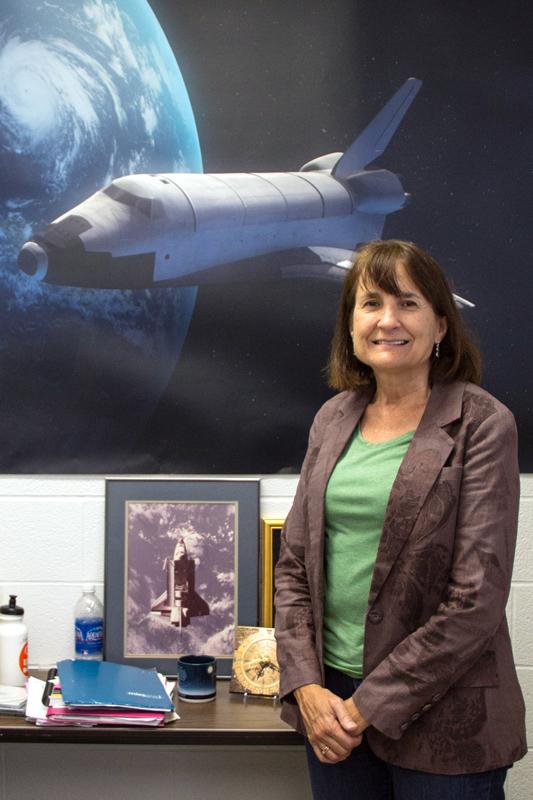Linda Godwin has had a whirlwind career, and it began right here in Missouri.
Godwin, a physics and astronomy professor and a native of Cape Girardeau, attended Southeast Missouri State University after high school. She studied physics and math and received a Bachelor of Science degree.
She then attended graduate school at MU and earned her master’s and a Ph.D. in physics. It was then she heard about NASA’s shuttle program.
“I looked at the education requirements for the position and realized I was eligible to apply,” she said.
The first time Godwin applied, she was not accepted. She reapplied, though, and after her second application, she secured an interview. She was offered a job in Mission Operations at the Johnson Space Center in Houston, Texas.
Five years later, Godwin was selected as an astronaut candidate.
She trained for about six years to prepare for her first space mission, STS-37, in the space shuttle Atlantis. The training included generic and mission-specific training. Generic training lasted about five years and included learning about orbital dynamics, shuttle systems and practicing spacewalks.
“Sometimes schedules were busy,” Godwin said. “Training in water tanks were long days, as we were in the suits for six or more hours, but it was all necessary. I remember thinking, ‘Only a few people get to do this. It’s kind of neat.’”
After she completed basic training, mission-specific training began. The goal of STS-37 was to deploy a large satellite that would function as a gamma ray observatory several hundred miles above the Earth.
Atlantis launched in 1991 and was successful. Godwin went on three subsequent space missions and spent more than 900 hours in space. She worked at NASA for more than 30 years.
“My favorite thing was the great operations team,” she said, “Bureaucracy was left by the wayside, and everything came together in not much time.”
Godwin retired from NASA in 2010 and has kept ties with MU. In 2011, she was contacted about a position in the physics and astronomy department.
“It was a tough decision because we (Godwin and her husband) had been in Houston for a long time, but I knew it would be rewarding to come back and work with students,” Godwin said.
Godwin’s students and colleagues said it is very rewarding to work with her.
“I found Dr. Godwin to be a very engaging and interesting teacher because of her real-world experience,” sophomore Claudia Adams said. “I have a lot of respect for my teachers who have previous work experience in their field of expertise, because they are easier to relate to compared to other professors.”
Adams said professors with this experience could teach the valuable information necessary for success instead of students only learning from textbooks.
“She is absolutely delightful to work with,” professor and Director of Astronomy Angela Speck said. “She is so clearly having fun and seems to be thoroughly dedicated to trying to understand how to best serve the students.”
As the 2012 presidential election approaches, NASA has generated some talk amongst politicians. Godwin has varied feelings about the program’s future.
“The overall budget has flatlined,” she said. “In these days of tough fiscal issues, to even still have a flat budget is not so bad. But I am frustrated that it has never been funded quite enough to get the large launcher they’ve always talked about.”
Godwin also had mixed thoughts in regard to how some of NASA’s operations have been handed off to private corporations.
“I am enthusiastic about the seed companies, but we need other funding and a business plan that shows profit,” Godwin said.
Looking forward, Godwin said she hopes her students, particularly those in science-related fields, pursue their passions.
“I want them to know about their education,” she said. “Its real value is sometimes you don’t know what doors it’ll open for you.”








